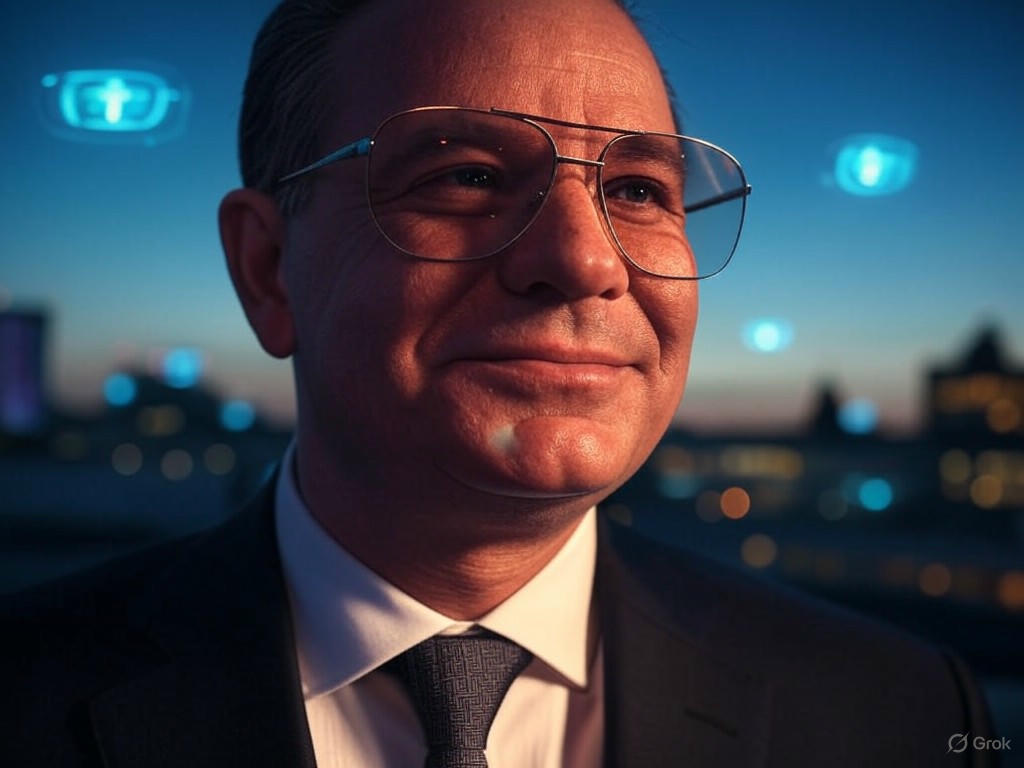
Friedrich Merz Poised to Become German Chancellor
Germany Enters a New Political Era
Friedrich Merz, the leader of the Christian Democratic Union (CDU), is on the brink of a historic moment as he prepares to take the helm as Germany’s next Chancellor. This transition, scheduled for May 6, 2025, in the Bundestag in Berlin, follows a three-year tenure under outgoing Chancellor Olaf Scholz. It’s more than just a leadership change; it’s a pivot toward fresh strategies in domestic reforms and global diplomacy, with Friedrich Merz at the center of this shift. Picture this: a nation eager for stability amid economic uncertainties, now looking to Friedrich Merz’s coalition for innovative solutions.[1]
As Friedrich Merz steps into this role, his victory in the 2025 election underscores a voter demand for center-right policies that prioritize growth and security. Have you ever wondered how a single election can reshape an entire country’s direction? In Germany, that’s exactly what’s happening, with Friedrich Merz’s CDU leading the charge to address challenges like inflation and digital transformation.
Who Is Friedrich Merz? A Profile of Germany’s Next Leader
Friedrich Merz stands out as a multifaceted figure in German politics—a lawyer, business leader, and now, the incoming Chancellor. Born on November 11, 1955, in Brilon, Germany, he began his career in the European Parliament in 1989 and later served in the Bundestag from 1994. After leading the CDU/CSU parliamentary group, Friedrich Merz took a break from politics in 2009, immersing himself in corporate roles that shaped his pro-business views.[2][3]
- He’s renowned for his socially conservative and business-oriented approach, making him a bridge between politics and industry.
- Friedrich Merz has held key positions, such as chair of the Atlantic Bridge and a supervisory board member at BlackRock Germany, enhancing his international network.
- With his transatlantic connections and global experience, he’s often praised as a pragmatic leader who understands both European and American dynamics.
- Beyond politics, Friedrich Merz is a hobby pilot and family man, married to judge Charlotte Merz, with three children, adding a relatable human touch to his public image.[2][3]
Friedrich Merz’s Political Path and Rivalries
Friedrich Merz’s road to leadership was anything but smooth. In the 2000s, he faced significant rivalry with Angela Merkel, who outmaneuvered him for the top spot. Merkel’s own words, “We both wanted to be the boss,” highlight the intensity of their competition. This setback led Friedrich Merz to pivot to the legal and corporate world, where he built expertise that later fueled his triumphant return and CDU leadership in 2022.[2][3]
Imagine returning to the political arena after years away—it’s a story of resilience that many admire. Friedrich Merz’s experience shows how diverse backgrounds can enrich leadership, especially in navigating Germany’s complex political landscape.
The 2025 Election: A Shift to the Center-Right
The 2025 national election marked a turning point, with Friedrich Merz’s CDU securing nearly 30 percent of the vote, outpacing competitors and signaling a clear shift. Held in February 2025, this victory ended the center-left era and positioned Friedrich Merz at the forefront of a new coalition involving the CSU and Social Democrats. It’s fascinating to see how voter priorities, like economic stability and innovation, propelled Friedrich Merz to this win.[1][4]
- The CDU’s success reflects a widespread desire for reliable governance and business-friendly reforms.
- This coalition blends centrist and conservative elements, promising a balanced agenda under Friedrich Merz’s guidance.
- The new cabinet features 17 federal ministers from the CDU, CSU, and Social Democrats, ensuring diverse input while Friedrich Merz steers the ship.[1]
What does this mean for everyday Germans? With Friedrich Merz in charge, policies could focus more on practical economic boosts, like tax incentives, which might directly impact families and businesses.
What to Expect from the Merz Government?
As a transatlanticist with deep business ties, Friedrich Merz is expected to emphasize economic competitiveness and innovation. Experts anticipate a government that fosters pro-market reforms, digital advancements, and fiscal responsibility. For instance, Friedrich Merz might draw from his BlackRock experience to push for investments that modernize Germany’s industries.[2][3]
- Look for incentives that encourage business investment and reduce red tape.
- A strong push toward digitalization could help Germany compete globally, perhaps through new tech hubs or AI initiatives.
- Conservative values will likely shine through in family policies and budget management, reflecting Friedrich Merz’s core principles.
- His global outlook promises deeper engagement with Europe and allies, potentially strengthening trade deals and security pacts.[2][3]
Comparing Merz and Scholz: A Policy Breakdown
To grasp Friedrich Merz’s potential impact, let’s compare his approach with Olaf Scholz’s in key areas. This table highlights how Friedrich Merz’s vision might diverge, offering a more business-centric path.
| Policy Area | Olaf Scholz | Friedrich Merz |
|---|---|---|
| Economic Policy | Center-left focus on social investment and regulations | Pro-business emphasis on deregulation and market incentives |
| Foreign Policy | Consensus-driven EU leadership | Transatlantic focus with global business alliances |
| Social Policy | Progressive welfare expansions | Family-oriented and initiative-driven approaches |
| Climate Policy | Regulatory green transitions | Balanced strategies that protect industrial competitiveness |
Friedrich Merz’s strategies could mean more opportunities for entrepreneurs, but at what cost to social programs? It’s a debate worth watching.
Transition Ceremony and First Steps
The handover from Scholz to Friedrich Merz will feature traditional ceremonies, including a farewell attended by key figures. Once elected, Friedrich Merz and his team will be sworn in by President Frank-Walter Steinmeier. Their first cabinet meeting on May 6, 2025, will tackle immediate priorities like forming a cohesive government.[1]
This moment symbolizes renewal—much like a relay race where Friedrich Merz picks up the baton to sprint ahead on critical issues.
Implications for Germany and Beyond
Friedrich Merz’s leadership arrives amid global tensions, influencing Germany’s stance on European unity, economic resilience, and tech innovation. For example, in a world of supply chain disruptions, Friedrich Merz might advocate for stronger alliances to bolster security.[1]
- Expect enhanced partnerships for security and trade.
- Economic policies could combat inflation through targeted reforms.
- Innovation in technology might lead to new jobs and exports.
- Geopolitical responses could evolve, addressing crises with a steady hand.[1]
How will Friedrich Merz balance these challenges? His decisions could ripple across Europe, affecting everything from NATO relations to climate agreements.
Global and Domestic Reactions
Reactions to Friedrich Merz’s rise are varied: Business sectors applaud his credentials, while progressives worry about social policy shifts. Internationally, allies in the US and NATO view Friedrich Merz’s transatlantic focus as a stabilizing force.
What’s Next for Germany Under Friedrich Merz?
Moving forward, Friedrich Merz’s agenda includes managing the coalition, recalibrating economic policies, and engaging in diplomacy. Key areas like tax reform and digital strategies will be in the spotlight, potentially reshaping Germany’s role in the EU.
If you’re interested in global politics, consider how Friedrich Merz’s moves might inspire similar shifts elsewhere—it’s a real-world example of leadership evolution.
Conclusion: A New Chapter for Germany
With Friedrich Merz as Chancellor, Germany is embarking on a path that honors tradition while embracing change. His coalition provides a strong foundation for tackling modern challenges, from innovation to international relations. As we look ahead, it’s exciting to think about the possibilities—will Friedrich Merz’s vision lead to a more prosperous Germany?
What are your thoughts on this transition? Share your insights in the comments below, and feel free to explore more on German politics through our related articles. If this topic sparks your interest, spread the word or dive deeper into our site for more updates.
References
- Friedrich Merz Set To Become New German Chancellor – Evrimagaci.org
- Friedrich Merz Biography – Britannica.com
- What to Know About Friedrich Merz – PBS NewsHour
- Who is Friedrich Merz? – France 24






